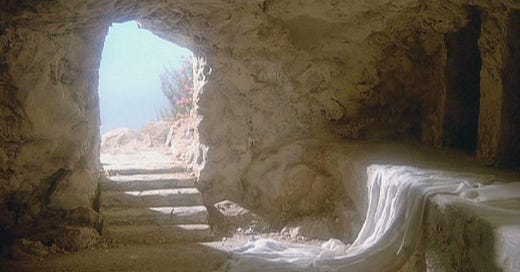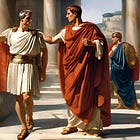He Is Risen: Why You Must Decide Who Jesus Is This Easter
An historical Jesus was crucified and rose from the dead. These are facts. They can only be avoided so long.
This essay is free, but with Premium Membership you get MORE. Join today.
by Rod D. Martin
April 20, 2025
I am not one to “take someone’s word for it”. I have built an entire career on facts, logic, science, and reasonable inferences therefrom. Many of those inferences seemed counterintuitive at the time, but were correct, precisely because of the other three.
That’s exactly how I came to faith. Christ miraculously redeemed me, but in His kindness to meet each of us where we are, He presented my skeptical heart with the historical case for believing in Him. That was exactly what I needed to see, and it opened the door to the intimate, personal relationship with Him that’s available to all who place their trust in Him.
God is our Creator. He owns everything and everyone. We are rebels, subject to a traitor’s death. But God provided an escape, paying the price of our treason by entering history in the flesh and shedding His own sinless blood for all those who “confess with their mouth that Jesus is Lord and believe in their heart that God raised Him from the dead”. Nor does He make us mere servants: once set right judicially, He adopts us as His own sons and daughters, “co-heirs with Christ”.
That’s what Easter is about.
Easter is not about bunnies. It is not about eggs. It is not a celebration of springtime, nor is it a warmed-over pagan fertility rite in Christian clothing. It is about a claim so bold, so outrageous, and so world-shattering that if it’s true, it changes everything.
That claim is this: that Jesus of Nazareth, a Jewish carpenter crucified under Pontius Pilate, physically rose from the dead three days later.
Not metaphorically. Not spiritually. Not as a nice symbol of renewal or a poetic expression of hope. He walked out of a sealed tomb in the middle of Roman-occupied Judea, showed Himself to hundreds of eyewitnesses, and transformed history so radically that time itself was eventually divided by the date of His birth.
Believing that is a big ask. But let’s be honest: a God who could not do such a thing is no God at all. The miracle is that He would do it.
The resurrection is the very center of Christianity. And if it didn’t happen, the entire Christian faith collapses. As the Apostle Paul put it, “If Christ has not been raised, then our preaching is in vain, and your faith is in vain” (1 Corinthians 15:14). Christianity is not a philosophy of life. It is not a self-help system. It is not one religion among many. It is the declaration that God entered history in the person of Jesus Christ, and that He proved it by rising from the dead.
The Trilemma: Who Is This Man?
C.S. Lewis, the great Oxford professor and former atheist who wrote Mere Christianity, put it plainly. Jesus did not leave us the option of calling Him merely a “good moral teacher.” That line may sound respectable today, but it is not rational. Because Jesus didn’t just teach love and kindness. He claimed to be God.
“I and the Father are one,” He said (John 10:30). “Before Abraham was, I am” (John 8:58), deliberately using the sacred name God gave to Moses at the burning bush. When His disciple Thomas declared, “My Lord and my God!” Jesus didn’t correct him — He accepted the title.
This brings us to Lewis’s famous trilemma. If a man goes around claiming to be God, there are only three logical possibilities:
He is a liar — He knew He wasn’t God, but deliberately misled people, making Him evil and certainly not a great moral teacher.
He is a lunatic — He genuinely believed He was God, but was out of His mind, like a man who thinks he’s a poached egg.
He is Lord — He really is who He claimed to be.
But what you cannot say is that He was just a good teacher. “A man who was merely a man,” Lewis writes, “and said the sort of things Jesus said would not be a great moral teacher. He would either be a lunatic — or else he would be the Devil of Hell. You must make your choice.”
The Resurrection Is the Crux
Josh McDowell, who through Keith Whitworth led me to Christ, popularized Lewis’s trilemma in the phrase “Lord, liar, or lunatic?” and applied it directly to the resurrection. McDowell, also a former skeptic, began his investigation of Christianity intending to disprove it. Instead, he became one of its most prominent defenders.
Why? Because the evidence for the resurrection, when honestly examined, is astonishing.
Here are just a few facts that demand explanation:
The Empty Tomb – Even the enemies of Jesus admitted the tomb was empty. The authorities spread the story that the disciples stole the body, which only makes sense if the tomb was in fact empty. But how could a group of terrified fishermen overpower professional Roman soldiers? And even if they could, they couldn’t assume success going in. Why would they be willing to die for a lie?
The Eyewitnesses – Jesus appeared physically, bodily, to many people after His death. Paul records in 1 Corinthians 15 that Jesus appeared to Peter, to the Twelve, and even to more than 500 people at once, “most of whom are still alive.” This was written within 25 years of the event — far too soon for myth or legend to develop. Anyone could check the facts. And many did.
The Transformed Disciples – On the night of Jesus’ arrest, His disciples fled. Peter even denied Him three times. They were defeated, confused, and in hiding: they had incorrectly believed He had come to overthrow the Romans and establish a physical kingdom in Jerusalem; they struggled to imagine that instead the Romans would kill Him. Yet within weeks they were boldly proclaiming that Jesus had risen — and they were willing to suffer torture and death for that claim. Men may die for what they believe to be true, but no one dies for what he knows is false.
The Explosion of the Early Church – Christianity should never have survived the first century. It proclaimed a crucified Jew as the risen King of the world. It directly contradicted the mandatory claims of the Roman Emperors. It faced persecution, ridicule, and death. Yet it exploded in the first century, and within two centuries more it conquered the Roman Empire — not by the sword, but by testimony.
The Conversion of Skeptics – Saul of Tarsus (later the Apostle Paul) was a Pharisee, an enemy of the church who hunted down Christians. But he had a direct encounter with the risen Christ that transformed him overnight. Likewise, James, the brother of Jesus, was a skeptic during Jesus’ lifetime — yet he too became a leader in the early church and died for his faith. What would it take to convince you your own brother was God?
No Other Explanation Works
Many theories have been offered to explain away the resurrection. All of them fail.
The Swoon Theory? Jesus didn’t really die, they say — He just fainted. But Roman soldiers were experts at execution, and the purpose of crucifixion was itself a torturous death from which no one was allowed to escape, much less recover. The soldiers even speared His side to confirm He was dead. And if somehow Jesus revived in the tomb, half-dead, bleeding, and crippled, He would not have inspired worship: He would have needed a doctor.
Mass Hallucination? Hallucinations are personal. 500 people don’t hallucinate the same thing, at the same time, in multiple places, at least not without mass media manipulation. And hallucinations don’t eat breakfast with you on the beach, like Jesus did with His disciples (John 21).
Stolen Body? By whom? Not the Romans — they wanted to crush the movement. Not the Jews — same reason. Not the disciples — they were terrified, and had nothing to gain but death. And again: why die for something you know you made up?
The best explanation for the empty tomb, the eyewitness accounts, and the explosion of Christianity is simple: Jesus actually rose from the dead.
Why It Matters
This is not a mere intellectual curiosity. It is the most important question you will ever face.
If Jesus rose from the dead, He is exactly who He said He is: the Son of God, the Lord of heaven and earth. And that means every one of His claims is true.
He said He came “to seek and to save the lost.” He said, “No one comes to the Father except through Me.” He promised, “Whoever believes in Me will not perish, but have everlasting life.”
The resurrection is God’s stamp of approval on all of it. As Paul says in Romans 1:4, Jesus “was declared to be the Son of God in power according to the Spirit of holiness by His resurrection from the dead.”
If Jesus is Lord, then you must deal with Him. You cannot ignore Him. You cannot brush Him off as a wise man or moral teacher. He claimed your allegiance. He died for your sins. He rose again to offer you eternal life.
You Must Decide
The choice is yours.
You can say He was a liar, but liars don’t speak with the moral clarity of the Sermon on the Mount, or die forgiving their murderers.
You can say He was a lunatic, but lunatics don’t articulate logically-consistent brilliance, or found the greatest movement in human history.
Or you can say He is Lord — and fall at His feet in worship.
That is what Easter demands of you. Not a basket of candy. Not a sunrise service with pretty music. But a verdict.
As Jesus asked His disciples, so He asks you: “Who do you say that I am?”
Peter answered, “You are the Christ, the Son of the living God.”
What will you say?
This Easter, don’t just enjoy the holiday. Examine the evidence. Confront the reality. And respond to the risen Christ. He is not just a figure of history. He is alive. He is King. And He is calling you home.
“If you confess with your mouth that Jesus is Lord and believe in your heart that God raised Him from the dead, you will be saved.” —Romans 10:9
He is risen. He is risen indeed.
Further Reading:
Mere Christianity — C.S. Lewis
Evidence That Demands a Verdict — Josh McDowell
The Case for Christ: Solving the Biggest Mystery of All Time - Lee Stroble
Cold-Case Christianity: A Homicide Detective Investigates the Claims of the Gospels - J. Warner Wallace











He has Risen.
Your essay is so similar to my pastor’s at Crosspoint Hutchison’s message today! Incredible. The message is clear and people do need to decide.